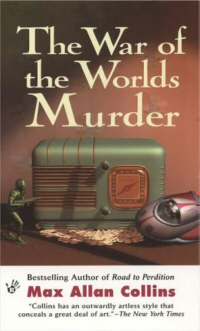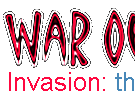The War of the Worlds Murder by Max Allan Collins (2005)

It's not at all unreasonable to propose (with tongue slightly in cheek) that Orson Welles got
away with murder the night he terrified America with his War of the Worlds broadcast, but this
novel poses the intriguing question, what if there was a real murder that very night, and what
if it happened in the same New York studio from which the drama was transmitted? What if in
fact, Welles was the chief suspect? That in of itself is a fantastic idea for a murder mystery,
but then the author really pulls out all the stops by working in none other than Walter Gibson
as his detective character, and if the writer of The Shadow can't track down a murderer, then
surely no one can.
A few days before the War of the Worlds broadcast, a giddy with anticipation Gibson arrives
in New York at the behest of Orson Welles. He has been invited to work on a script treatment
for a movie of The Shadow, with Welles naturally lining himself up as the star! That no such
movie ever existed in form or thought is irrelevant - it easily could of - and author Max
Allan Collins makes it all sound very plausible with the addition of a cunning "factual"
embellishment. This is actually a true story claims Collins, because it was an aged Gibson
himself who related the tale to the author, over a beer at a crime writers convention.
As Gibson explains, he was soon embroiled in the chaos and passion that is the Mercury Theatre.
Introduced to Howard Koch and John Houseman, he is privy to the shimmering tensions that power
the Mercury, both on and off the air, and becomes a confidant of Welles, to the extent that he
is invited to sit in on the creative process behind the War of the Worlds broadcast.
Collins has done his research and clearly loves the period and the process of radio drama,
painting a painstakingly detailed reconstruction of the run up to, transmission and aftermath
of the broadcast. It is a real delight for any student of the events of that night, none more
so than this reviewer, because Collins kindly acknowledges this website as one of his sources!
It's certainly an honour to have contributed in some small way to such an excellent novel, but
I hasten to say that I offer that plaudit in all honesty, not out of any misguided attempt at
returning the favour. This really is a fantastically well-written novel, weaving fact and fiction
together in a seamless fashion, such that in many respects, this represents a pretty accurate
history of the events of October 30th 1938.
But what about that murder? You might be forgiven for wondering if I'd ever get round to
mentioning it, and if I wasn't so completely enamoured of Colin's beautifully crafted recreation
of the broadcast, I'd probably have to say (with arm bent painfully behind back) that the murder
mystery does play second fiddle to the events in the studio. Personally I'm more than happy with
that, but if you are looking for a pure blood soaked murder mystery, you might come away a little
disappointed. However if you want an excuse to revisit the story of the broadcast from a new
and unique angle, you'll find the "murder" perfectly satisfying and like me, just revel in the
period detail. Given the connection between Orson Welles and The Shadow, the use of Gibson as a
character is inspired, and the idea that Welles might have asked Gibson to work on a movie is
one of those alluring "what if" possibilities that sets the imagination positively racing.
Assuming of course that this is all made up and that meeting between Collins and Gibson never
actually took place. Now there's a thought.
|
Buy
See also
Books
Comics
|
1973
Killraven. A bold attempt to show a war of resistance against a conquering second Martian Invasion in the year 2001.
|
|
1996
The Haven and the Hellweed. A gritty vision of a modern day Earth under the heel of the Martians. A more realistic counterpoint to the Killraven series.
|
|





